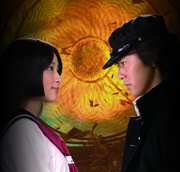Review for For Love's Sake
Introduction
If you’re interested in foreign cinema, or indeed any particular niche of the entertainment industry, then it would behove you to stay glued to social media these days, as sites like Facebook and Twitter are usually the first place, if not the only place to get news about the titles that would interest you. It also offers an unprecedented opportunity for direct dialogue with distributors. I always have an eye on Third Window Films’ Facebook page, and over the last year or so, there has been a constant frequency of requests for the films of Takashi Miike. The response has usually been negative, and understandably so. Miike’s best known films in the UK are movies like Audition, Ichi the Killer, 13 Assassins, and Sukiyaki Western Django. They are interesting and entertaining titles to be sure, but never quite typical of Third Window Films’ atypical and eclectic approach to Eastern cinema. You’d expect them to get released by other distributors, distributors more at home with the mainstream of independent cinema, and sure enough those titles are available in the UK from other companies.
The thing about Miike though is he is a very prolific director, and with his penchant for mixing and matching, bending and subverting genres, he is just as eclectic in his output as is Third Window Films. It was only a matter of time that the Venn diagram that was Miike and Third Window Films would reveal a title in the intersection of sets. It was just a question of which movie it would be. That movie has turned out to be For Love’s Sake, and actually becomes Third Window Films’ third musical, following Dasepo Naughty Girls and Underwater Love. Miike is no stranger to the manga adaptation, and indeed no stranger to the delinquent high school battle genre. I’ve enjoyed his Crows Zero films, and For Love’s Sake seems on the surface to be another venture in that direction. It’s based on a manga called Ai to Makoto, and as such is set in the 1970s, bringing a period feel to its high school combat, but this story has romance at its heart. It’s what you would get if you crossed Crows Zero with Romeo and Juliet, or given the musical genre, West Side Story. But For Love’s Sake is unlike any musical you will have seen.
Ai Saotome comes from a wealthy and well-to-do family, and it was during a skiing trip as a child that a young boy came to her rescue when she was in an accident. Eleven years later, she’s in high school, indeed the highly prestigious Aobadai Prep School, when she encounters that boy again. Only now Taiga Makoto is a delinquent, who makes his mark picking fights. Ai is dismayed at seeing her knight in shining armour behaving so violently, and decides to rescue him. She first tries getting him transferred to her school, but while you can take the delinquent off the streets, you can’t stop his delinquency. His first impression in his new school is hardly positive, and it only gets worse. It isn’t long before Makoto is expelled, and sent to a school more appropriate to his talents. In Hanazono Trade school, Makoto isn’t even the biggest dog, and he’s quickly attracting the wrong kind of attention. But Ai hasn’t given up on her knight, and soon the worst class in a school full of delinquents, has a delicate flower as a new transfer student...
Picture
For Love’s Sake gets a 2.35:1 widescreen transfer at 1080p resolution. And Joseph would like his Dreamcoat back... If you need a reminder of just how garish a decade the 1970s were, For Love’s Sake does the job with impeccable, if retina damaging accuracy. Miike has opted for a rich, lush and vivid colour palette for the film, wholly stylish and evocative of the period setting. The nightlife of 1970s Tokyo is often seen on screen, all neon signs and disreputable bars. The colours are deliciously saturated, almost to the point of excess, while costumes, locations and decor are rich in detail. It’s all served well by the Blu-ray presentation, although I shudder to think how this film will look on DVD.
The images in this review are sourced from the PR and aren’t representative of the final retail release.
Sound
You have a DTS-HD MA 5.1 Japanese audio track, with optional translated English subtitles. It’s a nice robust surround track, if not too dynamic. The dialogue is clear throughout, and it all gets nice and meaty for the action sequences. The musical numbers come across well, and it all works to make the viewing experience enjoyable. If I did have an issue, it’s that the disc cannot show more than one subtitle stream simultaneously. That issue becomes apparent in one song during the movie, where a character speaks over the singer. The subtitles opt to translate the spoken dialogue, and the song lyrics during that moment go un-translated, although they are translated for the rest of the song. The solution would have been to continue with the lyric subtitles at the bottom of the screen and have the dialogue translation at the top. A similar problem arises at the end credits, where the song lyrics aren’t translated at all, in favour of translating the credits instead.
Extras
For Love’s Sake gets the usual animated menu for the Blu-ray, letting you choose from scene selections, extras, subtitles and playing the movie. There is a similar pop-up menu accessible during playback.
The most substantial extra is the 35 minute Making Of the film, presented in 480i SD, with behind the scenes and b-roll footage, interspersed with interviews with the director and the film’s cast.
Play Musical Numbers allows you to enjoy the songs from the film, without any of the pesky narrative bits. It’s presented as a 29 minute reel, cutting together the songs from the film directly, and quite logically it’s also in 1080p widescreen with DTS-HD MA 5.1 Japanese audio. There’s a scene access for this feature if you need it, letting you jump directly to your song of choice.
Finally there are trailers for the forthcoming Land of Hope, and For Love’s Sake.
Conclusion
Grease was never like this! Well, maybe if Tarantino had directed Grease... If you’ve seen any of the Crows Zero movies, you’ll know how Miike handles High School gang violence and delinquency, with an over the top brutality and callousness that elevates it to a choreographed ballet of fists and kicks. It’s testosterone filled excess that entertains because of its unreality. In the Crows Zero films, while there are female characters, and indeed romantic interests, these are almost afterthoughts, as the real object of the films is the male bonding and the gang rivalries, as well as the discovery of self through an expression of violence. For Love’s Sake starts with this premise, and then blends it with a star-crossed lovers, Romeo and Juliet storyline, and then turns the whole thing into a musical on top of that. It shouldn’t work, but it does, and does so with spectacular effect. For Love’s Sake is a visual frenzy, an explosion of riotous and oversaturated colours.
While the visual impact of the film is undeniable, I have to admit that I couldn’t really engage with it, as its extreme violence, romance and comedy hangs together somewhat awkwardly. It’s a contrast in extremes, with silly goofiness in one moment, and some quite stomach churning and chilling scenes in the next. On the other hand, that unevenness of tone does make For Love’s Sake quite unpredictable, and that certainly works to hold the attention. You never quite know just where the film is going to head next.
Like the best musicals, the story is very simple, one of a love between opposites. Ai is from the rich, well-to-do end of the social spectrum, with everything gifted to her with a silver spoon, while Makoto comes from the other side of the social divide, having to fight for everything in his life, quite literally so, and has turned quite cynical as a result. Eleven years previously, as we learn in an anime prologue, Makoto saved Ai, and the experience marked both of them. Meeting again as high school students kindles a love for Makoto in Ai, and she determines to redeem him. By this time, Makoto’s a full on delinquent, and when we first meet him, he’s taking on all opponents in a mall, a sequence that begins as a song and dance number, and degenerates into what might be cinema’s first song and rumble...
She tries first taking him into her world, her exclusive prep school, where hopefully he’ll give up his delinquent ways and recognise her devotion. Makoto is untrusting, and his cynicism compels him to not take her seriously. We also learn that Ai has an admirer of her own, in the school’s head of the student council, Hiroshi Iwashimizu, who is just as demonstrative about his love for her as she is about her love for Makoto. But Makoto makes a lasting, and wholly negative impression on his new school, and winds up expelled. It’s when Ai follows him to his new school, a school whose student body is collectively delinquent, that he begins to understand her feelings for him. By then it’s too late, as this school already has its top dog, and Makoto winds up ruffling the wrong feathers, as well as attracting some more unwanted female attention. These new foes will do whatever it takes to bring him down, including using his ‘girlfriend’ Ai.
It’s around this time that For Love’s Sake loses its goofiness and takes on a rougher and even a little unpalatable edge. I guess in some ways it’s refreshing to see that Makoto is an equal opportunities delinquent, and doesn’t discriminate in who he fights. But when he’s beating up a girl gang, the violence seems less ‘cartoon-like’ for want of a better word.
There were moments in For Love’s Sake that I really enjoyed, but there were also moments that made me uncomfortable. I also found a lack of resolution to the central arc that was quite frustrating. While the film has a definite conclusion, I thought it was unsatisfying and left too much hanging. Perhaps the sense of futility is appropriate to the story, and what the director was ultimately aiming for. Also, for a musical, I thought either the film was too long, or that there really could have been some more songs. As it is, they are spaced too far apart, and you almost forget that you’re watching a musical by the time the next number shows up. The songs are infectious though, the production value and visuals are sublime, and it’s well worth experiencing once at least, just for the sake of watching something completely different. Miike fans will also appreciate yet another genre mash-up from the prolific director.


















































Your Opinions and Comments
Be the first to post a comment!